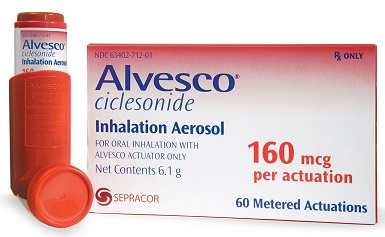BREAKING! Taiwanese Study Shows Inhaled Ciclesonide Reduces Risk Of Mortality And Need For Mechanical Ventilation In Hospitalized COVID-19 Patients
Source; COVID-19 Drugs -Inhaled Ciclesonide Oct 30, 2022 2 years, 5 months, 3 weeks, 1 day, 9 hours, 18 minutes ago
COVID-19 Drugs: A new study by researchers from the Division of Pulmonary and Critical Care Medicine at MacKay Memorial Hospital- Taiwan has found that the usage of inhaled Ciclesonide reduces risk of mortality and need for mechanical ventilation in hospitalized COVID-19 patients.

Thailand Medical News had already reported as early as August 2020 about the possible prophylactic and also therapeutic uses of inhaled ciclesonide against the SARS-CoV-2 virus.
https://www.thailandmedical.news/news/coronavirus-treatments-japanese-study-indicates-ciclesonide,-an-inhaled-steroid-has-potential-for-covid-19-treatment-after-positive-vitro-study
https://www.thailandmedical.news/news/a-simple-guide-to-supplements,-herbs-and-repurposed-drugs-that-can-help-with-covid-19
https://www.thailandmedical.news/news/a-simple-guide-to-supplements,-herbs-and-repurposed-drugs-that-can-help-with-covid-19
In fact a number of other inhaled corticosteroids or ICS also demonstrated efficacy against the SARS-CoV-2 virus.
https://www.thailandmedical.news/news/covid-19-drugs-german-study-confirms-the-antiviral-effects-of-budesonide-against-the-sars-cov-2-coronavirus-and-even-against-emerging-variants
https://www.thailandmedical.news/news/covid-drugs-oxford-randomized-trial-shows-that-inhaled-budenosonide-reduces-risk-of-covid-19-severity-and-hospitalization-when-used-early
https://www.thailandmedical.news/news/breaking-covid-19-drugs-study-trial-of-inhaled-corticosteroids-formoterol-budesonide-shows-potential-as-prophylactic-and-treatment-drugs
https://www.thailandmedical.news/news/covid-19-drugs-queensland-university-of-technology-and-oxford-university-exploring-budesonide-inhaler-therapy-for-early-covid-19-patients-in-new-trial
While a lot of the drugs that had potential against the older SARS-CoV-2 variants might not have any efficacy against the newer variants as a result of mutations in the Mpro proteins and also drug resistance that has also developed, inhaled ciclesonide and also
budesonide is believed to be still very effective against the newer Omicron variants and sub-lineages and also recombinant variants as its mechanistic targets of the viral genome have not been affected.
According to the Taiwanese researchers, “The successful management of patients infected with coronavirus disease 2019 (COVID-19) with inhaled ciclesonide has been reported, however few studies have investigated its application among hospitalized patients.
The
COVID-19 Drugs study team conducted a retrospective cohort study that enrolled adult patients admitted to their hospital with confirmed COVID-19 infection from May to June 2021. Critical patients who received mechanical ventilation within 24 h after admission and those who started ciclesonide more than 14 days after symptom onset were excluded. The in-hospital mortality rate was compared between those who did and did not receive inhaled ciclesonide.
Altogether a total of 269 patients were enrolled, of whom 184 received inhaled ciclesonide and 85 did not.
The study findings showed that the use of ciclesonide was associated with lower in-hospital mortality (7.6% vs. 23.5%, p = 0.0003) and a trend of shorter hospital stay (12.0 (10.0–18.0) days vs. 13.0 (10.0–25.3) days, p = 0.0577).
Importantly, in subgroup analysis, the use of inhaled ciclesonide significantly reduced mortality in the patients with severe COVID-19 infection (6.8% vs. 50.0%, p < 0.0001) and in those with a high risk of mortality (16.4% vs. 43.2%, p = 0.0037).
Also, it was found that the use of inhaled ciclesonide also reduced the likelihood of receiving mechanical ventilation in the patients with severe COVID-19 infection.
After multivariate analysis, inhaled ciclesonide remained positively correlated with a lower risk of in-hospital mortality (odds ratio: 0.2724, 95% confidence interval: 0.087–0.8763, p = 0.0291).
The study findings showed that the use of inhaled ciclesonide in hospitalized patients with COVID-19 infection can reduce in-hospital mortality.
The study team stresses that further randomized studies in patients with mild, moderate to severe COVID-19 infection are urgently warranted.
The study findings were published in the peer reviewed journal: BMC Pulmonary Medicine.
https://bmcpulmmed.biomedcentral.com/articles/10.1186/s12890-022-02168-8
It should be noted that not all inhaled corticosteroids or ICS are the same with regards to anti-inflammatory potency or inhibition of virus replication.
https://pubmed.ncbi.nlm.nih.gov/33746666/
A previous study found that found that inhaled ciclesonide, compared with other corticosteroids, blocked coronavirus replication in a cell culture line with low cytotoxicity.
https://www.biorxiv.org/content/10.1101/2020.08.22.258459v1.full
A South Korean randomized phase 2 trial also found that inhaled ciclesonide shortened SARS-CoV-2 viral shedding duration and may inhibit progression to respiratory failure in mild to moderate COVID-19.
https://pubmed.ncbi.nlm.nih.gov/34441840/
In the initial early stage of the pandemic, some case reports from Japan described that COVID-19 pneumonia could be improved after inhaled ciclesonide therapy, which is similar to what the Taiwanese researchers found earlier.
https://pubmed.ncbi.nlm.nih.gov/32402512/
https://www.sciencedirect.com/science/article/pii/S1341321X20301318
https://www.airitilibrary.com/Publication/alDetailedMesh?docid=P20190312001-202204-202204250002-202204250002-144-146
The results from subsequent randomized control studies regarding inhaled ciclesonide are however conflicting.
In one study of 400 symptomatic COVID-19 outpatients, the median time to alleviation of all COVID-19-related symptoms was not different between inhaled ciclesonide and placebo arms, although the inhaled ciclesonide group had fewer COVID-19-related emergency department visits and hospital admissions.
https://pubmed.ncbi.nlm.nih.gov/34807241/
However, it was found that in that study, they enrolled relatively mild and young (average 43.3 years) patients.
The CONTAIN trial was a phase II randomized controlled trial which compared intranasal and inhaled ciclesonide with placebo in 203 outpatients (average age 35 years), and reported no significant difference in the resolution of symptoms by day 7 between the ciclesonide and control groups.
https://pubmed.ncbi.nlm.nih.gov/34728476/
This suggests that inhaled ciclesonide may not be beneficial for healthy young COVID-19 patients.
However, this new study by the researchers from Taiwan is the first to report that inhaled ciclesonide could reduce in-hospital mortality among severe hospitalized COVID-19 patients.
For the latest on
COVID-19 Drugs, keep on logging to Thailand
Medical News.
